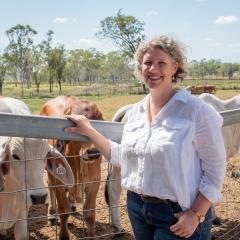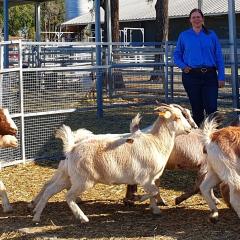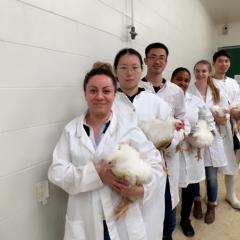Gervais Habarugira is a veterinarian committed to research and teaching in the area of infectious diseases and has recently been involved in a vaccine trial conducted at QASP. He holds an advanced diploma in animal health (2006) and a Bachelor of Veterinary Science (2010) from the Higher Institute of Agriculture and Animal Husbandry (ISAE) (currently the College of Agriculture, Animal Sciences and Veterinary Medicine, University of Rwanda). He obtained his Master of Veterinary Science in the field of veterinary diagnostic pathology (2016) and a PhD in 2023, from the University of Queensland (UQ). He is currently a Postdoctoral Research Fellow, in Dr Jody Peters’ lab at The School of Chemistry and Molecular Biosciences (SCMB) at UQ. His research interests involve, but are not limited to, understanding the pathobiology of infectious diseases, and developing control strategies.
How did you get started in animal research?
I first got involved in research when I did my first internship during my veterinary training. In most African countries, veterinary training puts more emphasis on production animals. Therefore, my research involved understanding livestock diseases such as bovine mastitis and bovine tuberculosis, their economic impact, and their control. The main aim was to address food security through control of production animal diseases.
Briefly describe the current project/s you are conducting at QASP
Our research group, previously led by Emeritus Prof Roy Hall (until March 2023) and now by Dr Jody Peters, focuses on developing vaccines and diagnostics for arboviruses of veterinary and human importance, notably zoonotic diseases. The group is currently developing a Japanese encephalitis virus (JEV) vaccine for pigs. After successfully testing the vaccine in weaner pigs, the next step was to assess the safety and immunogenicity of the vaccine in older, multiparous sows. We carried out this trial using the isolation facilities and support staff expertise of QASP. The ultimate goal is to make the vaccine available to pig farmers before the next JEV outbreak in pigs.
How did QASP staff and facilities help you in achieving your research aims?
QASP is the only PC2 (BSL2) DAFF-approved site for this kind of study in Queensland. The QASP state-of-the-art facilities and equipment were very useful in achieving all our aims and objectives. The commendable QASP personnel helped in all aspects of the project such as daily husbandry of research animals and sampling. QASP staff have been instrumental in setting up the modular facility tailored to the nature of our study to accommodate the old sows and allow a smooth workflow. The staff are skilled and experienced in DAFF regulatory requirements including sample labelling and traceability. Their interpersonal communication with researchers with regard to animal welfare, and accommodation of timings was beyond reproach.
What is your favourite aspect of your line of work?
I like studying a disease holistically, i.e., disease pathobiology including pathogenesis, immune responses, epidemiology, and control strategies. I also enjoy communicating my research findings through scientific writing.
What career advice would you give to your younger self?
Always look ahead, be a risk-taker, never regret and learn from your mistakes!
Fun question: If you wrote a book about your career so far, what would you title it?
Dream big, work hard, and be ambitious!



